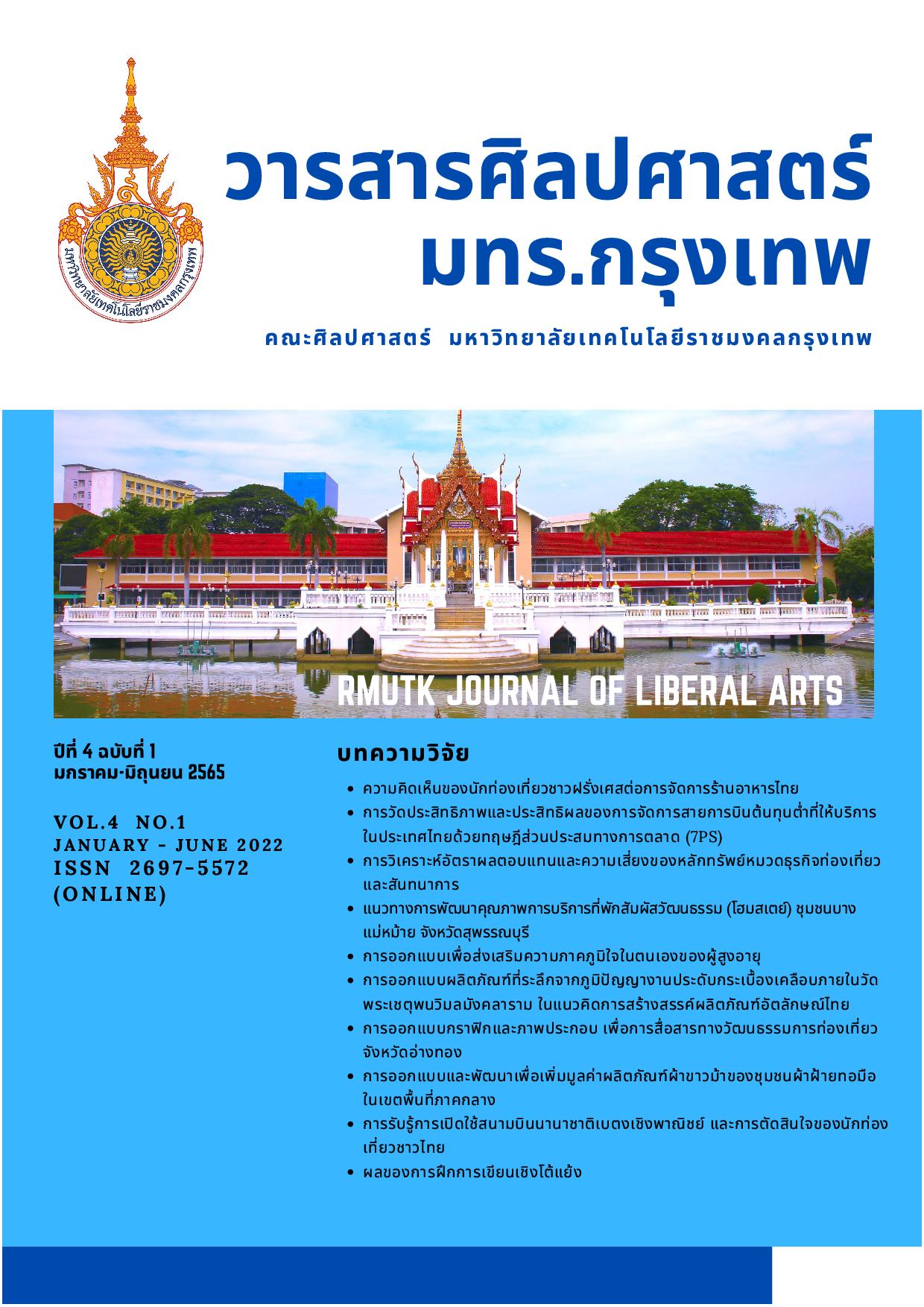RESULTS OF TRAINING IN ARGUMENTATIVE WRITING
Main Article Content
Abstract
This case study was to seek the results of training students majoring in English for International Communication in argumentative writing. The students were studying an argumentative writing course at Faculty of Liberal Arts, Rajamangala University of Technology Krungthep. A criteria and scale for teaching, learning, and evaluating argumentation developed by Kaewpet (2018a) was used to train the students. Thirteen of the students agreed to contribute their argumentative essays to this study. The first set of argumentative essays was from the practice session of the first lesson. It was concerned with 21st century skills. The second set was from the last lesson, and its content was about the students’ preferences regarding fact-to-face or online programs. The essays were evaluated by the same criteria and scale used during the training. It was found that the training yielded somewhat fair results from the first training and advanced to the much level from the last training. It was also found that the students performed better in terms of writing argumentation as a result of the training. However, the ability varied depending on the individual students. The findings suggested usefulness of explicit teaching and repetition in practice in order to obtain satisfactory results.
Article Details

This work is licensed under a Creative Commons Attribution-NonCommercial-NoDerivatives 4.0 International License.
References
คณะศิลปศาสตร์ มหาวิทยาลัยเทคโนโลยีราชมงคลกรุงเทพ. (2559). หลักสูตรศิลปศาสตรบัณฑิต สาขาวิชาภาษาอังกฤษเพื่อการสื่อสารสากล (หลักสูตรปรับปรุง พ.ศ. 2559). กรุงเทพฯ: มหาวิทยาลัยเทคโนโลยีราชมงคลกรุงเทพ (อัดสำเนา).
Bipinchandra, J. S., Shah, P. M., Puteh, S. N., Din, R., Rahamat, R. & Aziz, J. A. (2014). User Needs Analysis in Learning Argumentative Writing via Mobile Platform. in Procedia Social and Behavioral Sciences. 118, 198–205.
Bowen, G. A. (2009). Document Analysis as a Qualitative Research Method. Qualitative Research Journal, 9, 27–40.
Cambridge University Press. (2019a). Argument. Retrieved from https://dictionary.cambridge.org/dictionary/
english/argument.
Cambridge University Press. (2019b). Argumentation. Retrieved from https://dictionary.cambridge.org/
dictionary/english/argumentation.
Capel, S. & Whitehead, M. (2010). Teacher as a Researcher/Reflective Practitioner, in Learning to Teach Physical Education in the Secondary School, edited by Capel, S. & Whitehead, M. London: Routledge.
Deane, P. & Song, Y. (2014). A Case Study in Principled Assessment Design: Designing Assessments to Measure and Support the Development Argumentative Reading and Writing Skills. PsicologiaEducavita. 20, 99–108.
Domenech, M. & Krah, A. (2014). What Familial Aspects Matter? Investigating Argumentative Competences of Learners at the Beginning of Secondary Schooling in the Light of Family-based Resources. Learning, Culture and Social Interaction, 3, 77–87.
ETS–TOEFL. (2016). The TOEFL Test. Retrieved from https://www.ets.org/toefl (23 April 2016).
Golder, C. & Coirier, P. (1994). Argumentative Text Writing: Developmental Trends. Discourse Processes, 18, 187–210.
Helms-Park, R. & Stapleton, P. (2003). Questioning the Importance of Individualized Voice in Undergraduate L2 Argumentative Writing: an Empirical Study with Pedagogical Implications. Journal of Second Language Writing, 12, 245–265.
IELTS. (2016). About Us. Retrieved from https://www.ielts.org/.
Kaewpet, C. (2018a). Criteria and Scale for Argumentation. Theory and Practice in Language Studies, 8, 564–569.
Kaewpet, C. (2018b). Quality of Argumentation Models. Theory and Practice in Language Studies, 8, 1105–1113.
Kaewpet, C. (2018c). Quality of Argumentative Essays Written by Thai students. In Proceedings of CreTech 2018. 24–26 July, 217–222. Bangkok: Rajamangala University of Technology Krungthep.
Kaewpet, C., Duangpattra, K., Ackaradejruangsri, E. & Na Phairee, N. (2019). The Influence of Reasoning and Writer’s Voice on the Overall Quality of Argumentation. In Proceedings of CreTech 2019. 19–21 June: 168–174. Bangkok: Rajamangala University of Technology Krungthep
Kaewpet, C., (2019a). 1 214 403 Argumentative Writing. Bangkok: Faculty of Liberal Arts, Rajamangala University of Technology Krungthep (photocopied).
Kaewpet, C., (2019b). 1 214 403 Argumentative Writing (Final Test). Bangkok: Faculty of Liberal Arts, Rajamangala University of Technology Krungthep (photocopied).
Ka-Kan-dee, Maleerat & Kaur, Sarjit. (2015). Teaching Strategies Used by Thai EFL Lecturers to Teach Argumentative Writing. In Procedia Social and Behavioral Sciences, 208, 143–156.
Khodabandeh, F. (2014). Argumentation across L1 and L2: Examination of Three Instructional Treatments of Genre-based Approach to Teaching Writing. In Procedia Social and Behavioral Sciences, 98, 968–975.
Knoch, U.; Rouhshad, A., Oon, S. P. & Storch, N. (2015). What Happens to ESL Students’ Writing after Three Years of Study at an English Medium University?. Journal of Second Language Writing, 28, 39–53.
Laksana, S. (2016). Instrumentation. Retrieved from http://www.education.au.edu/wp-content/uploads/ 2016/09/instrumentation.pdf (3 March 2016).
Liu, F. & Stapleton, P. (2014). Counterargumentation and Cultivation of Critical Thinking in Argumentative Writing: Investigating Washback from a High-stakes Test. System, 45, 117–128.
Liu, X. (2013). Evaluation in Chinese University EFL Students’ English Argumentative Writing: an Appraisal Study. Electronic Journal of Foreign Language Teaching, 10, 40–53.
Liu, F. & Stapleton, P. (2014). Counterargumentation and Cultivation of Critical Thinking in Argumentative Writing: Investigating Washback from a High-stakes Test. System, 45, 117–128.
McLeod, S. (2019). What Does Effect Size Tell You?. Retrieved from https://www.simplypsychology.org/effect-size.html (20 April 2022).
Qin, J. & Karabacak, E. (2010). The Analysis of Tomlin’s Elements in Chinese EFL University Argumentative Writing. System, 38, 444–456.
Qin, W. & Uccelli, P. (2016). Same Language, Different Functions: a Cross-genre Analysis of Chinese EFL Learners’ Writing Performance. Journal of Second Language Writing, 33, 3–17.
Stapleton, P. & Wu, Y. (2015). Assessing the Quality of Arguments in Students' Persuasive Writing: a Case Study Analyzing the Relationship between Surface Structure and Substance. Journal of English for Academic Purposes, 17, 12–23.
Stangroom, J. (2017). Social Science Statistics. Retrieved from http://www.socscistatistics.com/tests/ Default.aspx.
Toulmin, S. (1958). The Uses of Argument. Cambridge: Cambridge University Press.
Varghese, S. A. & Abraham, S. A. (1998). Undergraduates Arguing a Case. Journal of Second Language Writing, 7, 287–306.
Walton, D. (1992). Plausible argument in everyday conversation. Albany, NY: State University of New York Press.
Yang, W. & Sun, Y. (2012). The Use of Cohesive Devices in Argumentative Writing by Chinese EFL Learners at Different Proficiency Levels. Linguistics and Education, 23, 31–48.
Yoon, H. (2017). Textual Voice Elements and Voice Strength in EFL Argumentative Writing. Assessing Writing, 32, 72–84.


